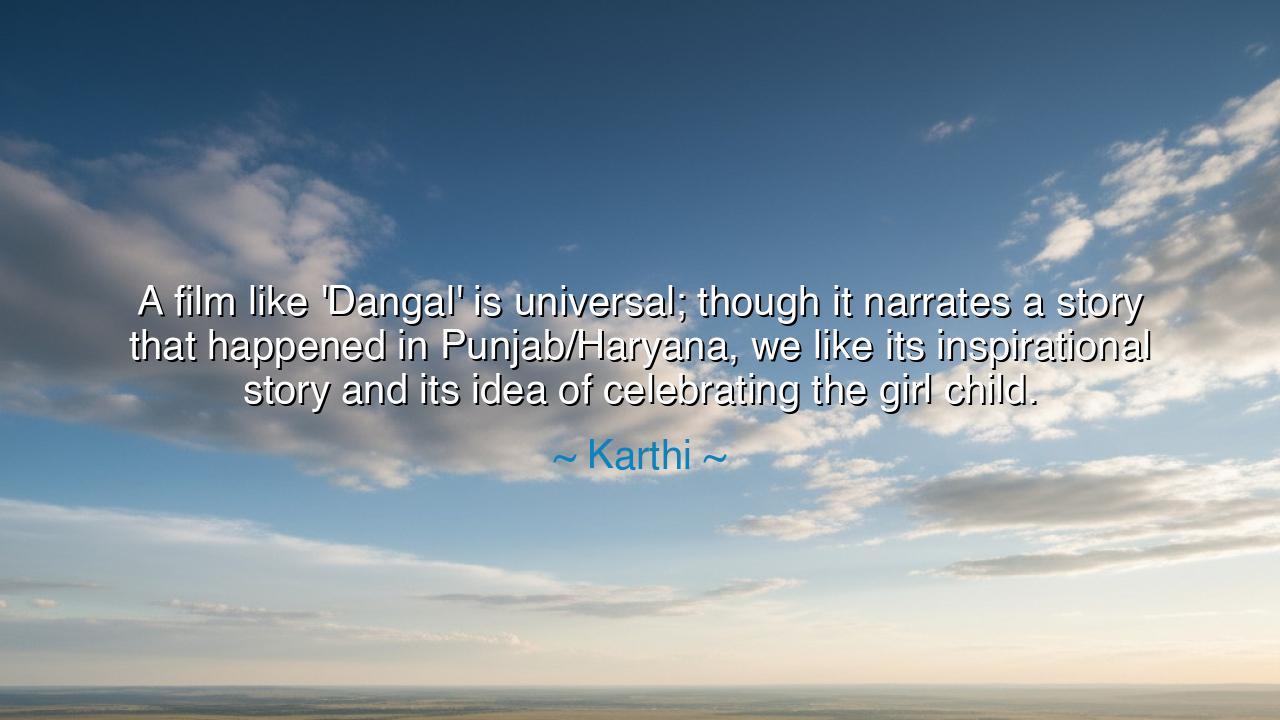
A film like 'Dangal' is universal; though it narrates a story
A film like 'Dangal' is universal; though it narrates a story that happened in Punjab/Haryana, we like its inspirational story and its idea of celebrating the girl child.






In the words of Karthi, the actor of depth and spirit, we find a reflection that transcends the borders of cinema and reaches into the heart of humanity: “A film like ‘Dangal’ is universal; though it narrates a story that happened in Punjab/Haryana, we like its inspirational story and its idea of celebrating the girl child.” Here, in this brief yet profound statement, lies the eternal truth that the most powerful stories are not confined by place or language — for the pulse of the human heart beats the same in all lands. The tale of courage, of struggle, of love, and of justice — these belong not to one people but to all.
The story of ‘Dangal’, though born from the soil of Haryana, speaks to every corner of the earth where dreams have been doubted and potential has been dismissed. It tells of a father, Mahavir Singh Phogat, who, despite the traditions that limited his daughters’ futures, saw in them not weakness, but strength. It is the story of a man who chose to defy the tide of convention and train his daughters to wrestle — not only in the arena, but against the chains of prejudice. What makes this tale universal, as Karthi observes, is that its essence — the triumph of perseverance, the equality of worth, and the beauty of belief — is a mirror to all human struggle.
The celebration of the girl child in this quote is not mere praise; it is a quiet revolution. In many lands, across ages, women have been asked to remain unseen, their strength veiled beneath silence. Yet in Dangal, the daughters rise — not through rebellion, but through discipline, faith, and the relentless pursuit of excellence. This is the ancient dance of transformation: where love becomes defiance, and defiance becomes destiny. What the father began in his humble home becomes a victory for every heart that has been told, “You cannot.” Karthi, in recognizing this, speaks not only as an artist, but as a witness to the unifying power of inspiration.
History itself is filled with echoes of this same spirit. Consider Joan of Arc, the peasant girl who led armies, guided not by privilege, but by conviction. Or Savitribai Phule of India, who lit the torch of education for women in a time of darkness. Their stories, like Dangal’s, were born in specific times and places, yet they speak eternally — for courage knows no border, and the heart that seeks justice speaks a universal tongue. When Karthi calls Dangal “universal,” he honors this lineage — the lineage of those who show the world that the measure of greatness is not gender, but soul.
Moreover, the inspirational tone of Dangal reminds us that art has always been the vessel of moral awakening. The ancients knew this well: they used myth not merely to entertain, but to instruct the spirit. Just as the Greeks told of Atalanta, the swift-footed woman who outran all men, and the Indians sang of Durga, the goddess who slayed the demon, so too does this modern story awaken the sacred truth — that the feminine is not to be diminished, but revered. Through the daughters’ triumphs, Dangal restores balance, reminding us that the world becomes whole only when every child — boy or girl — is free to fulfill their potential.
In Karthi’s admiration, there is also a call to unity through empathy. He reminds us that though our languages and lands may differ, we are moved by the same hopes. The success of Dangal across nations proves that emotion is the true language of mankind. When we witness another’s victory over oppression, something within us rises too. That is the miracle of art: it dissolves division and reveals our shared humanity. To celebrate a story like Dangal is to celebrate ourselves — our own capacity for belief, transformation, and love.
Thus, dear listener, the lesson is clear: seek and cherish the universal in the particular. When you see a tale from another culture, do not look for difference — look for resonance. When you hear of another’s struggle, see your reflection in it. And above all, as Karthi teaches through his words, celebrate the girl child, for in her lies the future’s light. Encourage her to rise, to learn, to lead — for when a girl is uplifted, humanity itself ascends. Let every home, every heart, become a place where daughters are not hidden but honored. In doing so, you will not only honor one film or one family, but the eternal story of inspiration, courage, and the boundless power of the human spirit.






AAdministratorAdministrator
Welcome, honored guests. Please leave a comment, we will respond soon